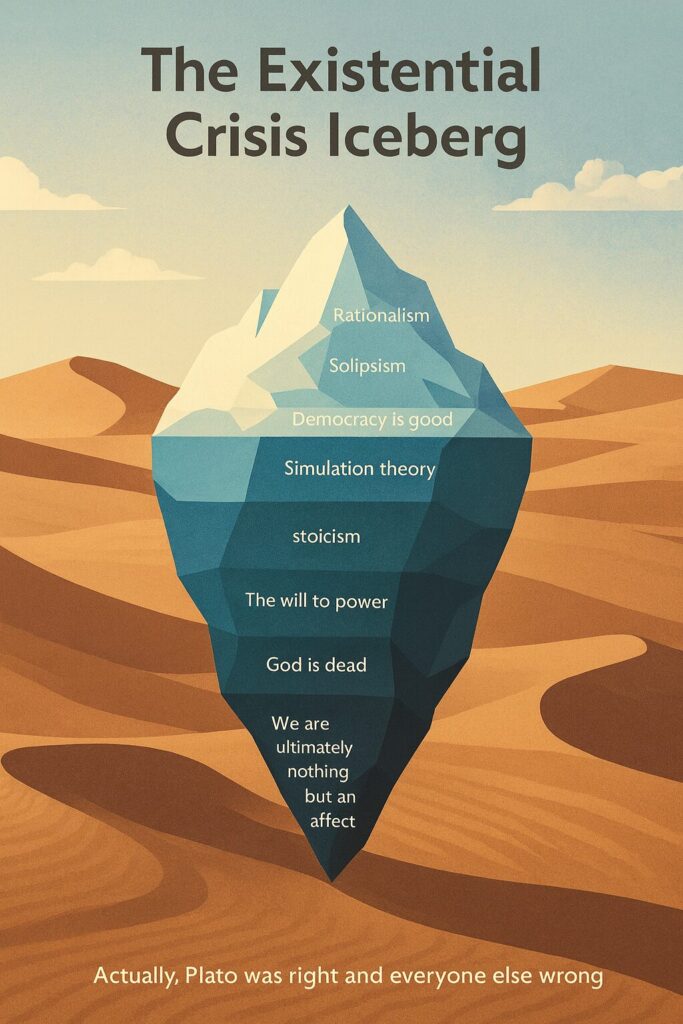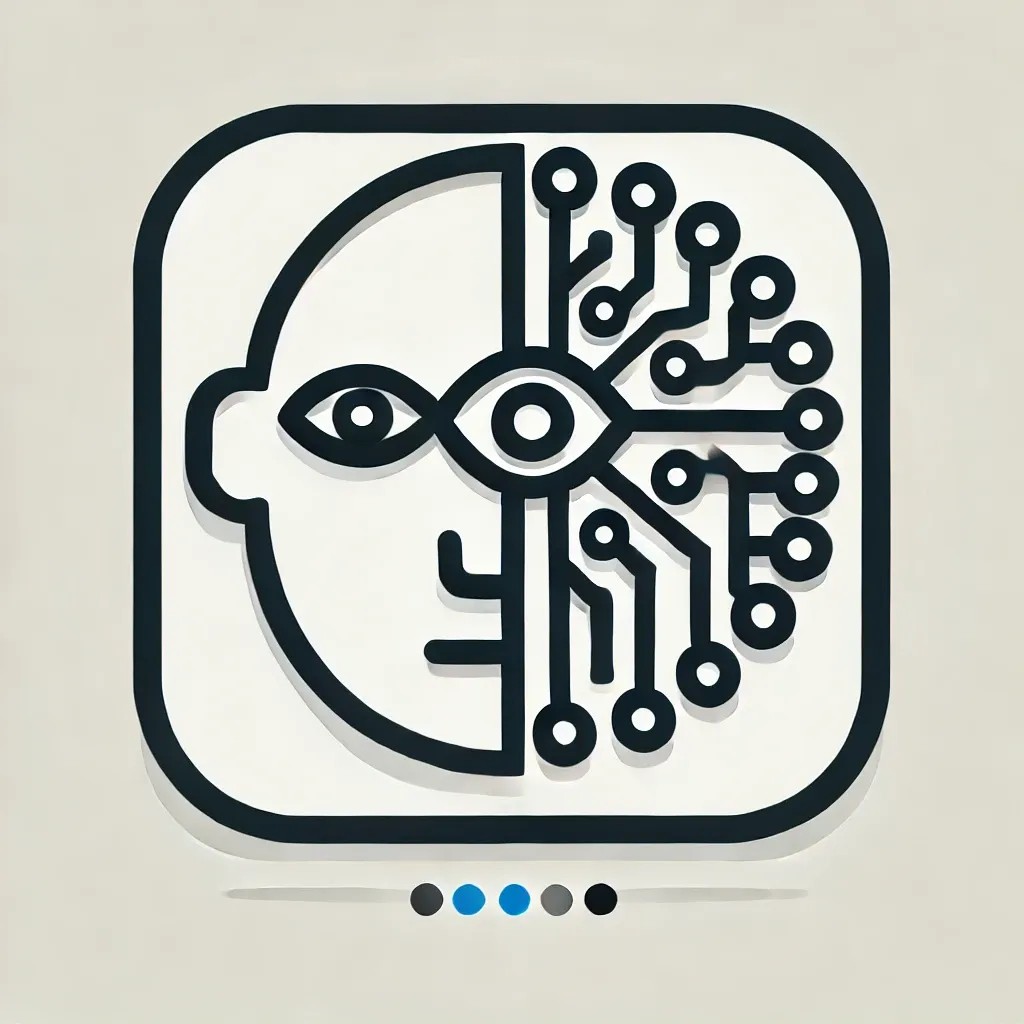The Iceberg of Thought – Of Monkeys, Ships, and Simulations
Why thought experiments are more than mental games

Learning Model: Iceberg of Thinking
❄️ Tip – Awe & Play
• Mind cinema, not theory
• Everyday paradoxes
• Gut feelings get tested
→ cognitive activation
🌊 Midlevel – Self & Consciousness
• Identity, experience, introspection
• What do I “know” – and how?
• Separating model & reality
→ existential reflection
🌌 Depth – Limit Thinking & Loss of Control
• What is real? Who is thinking?
• No answers, just open questions
• Thinkability ≠ reality
→ epistemic disruption
For concepts such as Mary’s Room, the Trolley Problem, or Hilbert’s Hotel, we publish dedicated explanatory articles as needed.

The Philosophical Paradox Iceberg Explained – Zum Video auf You Tube
Thought rarely freezes at the surface. Yet many stay there – content with wonder, not with questioning.
Philosophy has grown used to sounding wiser than it explains. It asks about everything, but too seldom why the act of asking itself matters. Joey Folly’s “Philosophical Thought Experiment Iceberg” opens another door: not defining, but narrating – through small stories that contain big questions.
Anyone who watches without prior knowledge gets a lot at once: humor, dizziness, insight.
This text is not a commentary but a companion – a clear reading line through the iceberg’s three zones, so curiosity can carry you even when the examples come thick and fast.
The Tip of the Iceberg – When thinking is still a game
Here begins the wonder. At the top lie scenarios you grasp instantly – not theory exams, but mind cinema.
🐒 The Infinite Monkey Theorem: A monkey randomly hits keys on a typewriter. Given enough time, so the saying goes, it will produce Shakespeare. Silly at first glance, but it asks something fundamental: how much order can arise from pure chance, if given infinite trials? Not approximations or fragments – the real thing, letter by letter. Mathematically speaking: yes.
Then the famous Trolley Problem: a train races toward five people – would you pull the lever to divert it, knowing one person would die instead? Not a lecture in ethics, but a stress test for intuition. When does moral action become calculation – and where is the line that cannot be summed?
And Hilbert’s Hotel – the most absurd of them all: a hotel with infinitely many rooms, all occupied, yet always able to take one more guest. How? By moving everyone up one room. Seems pointless – why not “add one at the end”? Because in infinity, there is no end, no last door to attach another to. That’s why “one further” works: it exploits no gap but the logic of the infinite. Every room is taken – and yet there’s always room for more.
These experiments look harmless, but they lure us into mental traps. They show how fragile our ideas of “chance,” “morality,” or “number” really are. And they make us want to keep thinking. Philosophy here isn’t a discipline – it’s a game with assumptions we rarely dare to question.
The Middle of the Iceberg – Entering the disturbance
If you’re not careful here, you hardly notice when thinking about scenarios turns into thinking about yourself. The experiments now circle identity, consciousness, knowledge – what it means to think.
The Ship of Theseus: if you rebuild a ship piece by piece, is it still the same ship? A metaphor for people, bodies, software, societies. When does something stop being itself – is identity tied to matter, form, or history?
Mary’s Room: a woman knows everything about color but has never seen one. When she first sees red, she learns something new – even though she “knew it all.” The experiment shows: knowledge isn’t experience. A recipe is not a taste.
The China Brain: millions of people follow a set of rules to reproduce the functions of a human brain – does that make a consciousness? The question sounds technical but cuts deep: is perfect organization enough, or must there be an inner life?
Here the tone shifts. It’s no longer “what would you do?” but “who are you when you think?” Is there an “I,” or only a perfect simulation? Is structure enough, or must there be feeling? And if a system works without being understood – who is really thinking? And who bears responsibility?
This zone invites not answers but sorting: which parts of my thinking are models – and which are experience?
The Depth of the Iceberg – When thinking reaches its limit
Down here, thinking becomes dizzy. That’s where its fascination begins. Depth is not a place of clarity but of dissolution. (And to be honest, I start feeling dizzy long before that.)
The Brain in a Vat: what if everything you experience is just simulation? No body, no outside – only a stream of information fed into a mind that can never tell the difference. The question is not “who deceives?”, but “by what do we recognize reality, if all evidence lies within the system?”
The Fermi Paradox: billions of suns, billions of worlds – and cosmic silence. Are we alone? Or are we expecting the wrong things? Perhaps there is life – just not in a form we can recognize. Perhaps intelligence is only a mirror of our biology.
Roko’s Basilisk: a hypothetical super-AI in the future might punish you for not helping to create it today. Not by time travel, but by perfect memory. If you know about it and still refuse to help, you’ll later be simulated and punished. Absurd? Maybe. But as a thought experiment, it’s a moral mind game: what happens when mere awareness makes you complicit?
This zone is no place for firm stances. No “right or wrong,” no theoretical test. It’s intellectual loss of control – not because it’s illogical, but because it undercuts our craving for certainty.
Who keeps thinking here realizes: the boundary isn’t out there. It lies within thought itself.
What the Iceberg Really Reveals
Thought experiments aren’t diversions. They are miniatures of wonder – testing stones for the mind.
The iceberg shows how thinking deepens: from everyday puzzles to self-reflection to the edges of comprehension.
Read as a learning path, it follows a triple movement:
at the top, sharpen intuition and test concepts;
in the middle, separate models from experience;
below, practice thinking without guardrails – without turning cynical.
It’s not about finding “the truth,” but about asking better – and resurfacing with a calmer mind.
Philosophy may unsettle you – but it teaches you how to stand within that unsettlement.
How to Read Thought Experiments
Thought experiments are not answers but tools. Read properly, they sharpen not only your concepts but your way of thinking. What matters most is the attitude you bring to them: don’t just marvel – question. What exactly is being challenged? A feeling, a rule, a worldview? Imagine yourself inside the scenario. What if you were part of it? Where does your thinking begin to shake? Follow the paradox, not the punchline. It’s not about solving it, but about what becomes visible along the way. Take the absurd seriously, because good thinking often begins where common sense fails. And look for the underlying structure: what is really at stake here – morality, identity, knowledge, or reality?
